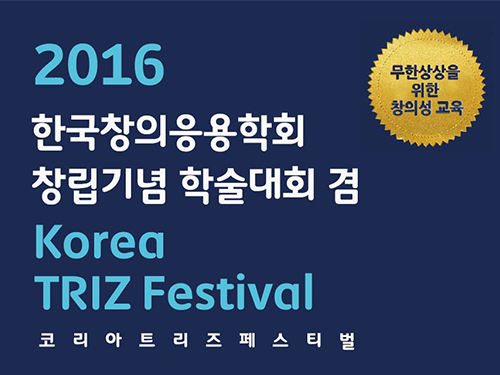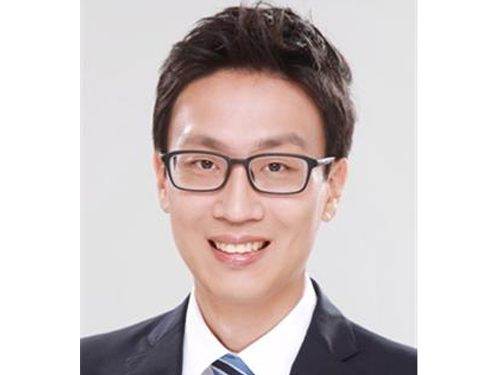creative+education
-
 Symposium on Creative Education
KAIST and the Korea Society for Creativity and Application (KSCA) co-hosted a symposium on creative education on January 21, 2016 at the KAIST Business and Management College in Seoul. Along with the symposium, the two organizations also held the Korea "Theory of Inventive Problem Solving" (TRIZ) Festival 2016.
Around 200 experts from academia, industry, and research including Dong-Suk Kim, Dean of the KAIST College of Business and Management and Gui-Chan Park, Director of POSCO Group Academy, attended the symposium.
The event was organized to celebrate the foundation of KSCA and to increase social awareness of creative education and design-related thinking with a "TRIZ approach."
"TRIZ" stands for the “Theory of Inventive Problem Solving” in Russian. It is a problem-solving method based on logic and data, not intuition, which accelerates the project team’s ability to work out issues creatively. The "TRIZ approach" has been widely used among Korean companies including Samsung, LG, and POSCO as a means of boosting employees’ creativity.
The academic symposium was divided into a keynote speech, paper presentations from each field, and a poster fair.
Professor Dae-Sik Kim from KAIST delivered a keynote speech on “Neuroscience and Creativity,” offering a glimpse of the world from a neuroscience perspective. Jae-min Lee, a researcher at Samsung Electronics, provided an industrial case study, “Application of TRIZ for the Improvement of Refrigerator.” Professor Jung-Seok Hyun from Jeju University and Dr. Jung-Ho Shin from E-Triz System presented their application of TRIZ on “Limitless Imagination and Invention Class for the Elementary School Students.” Altogether, 36 other research papers and case studies were presented at the symposium.
Dr. Dong-ryul Yang, President of KSCA, said, “This academic symposium allows us to discuss a range of innovative case studies that utilize TRIZ in industrial and educational fields, from which we can learn good lessons and practices.”
2016.01.19 View 7585
Symposium on Creative Education
KAIST and the Korea Society for Creativity and Application (KSCA) co-hosted a symposium on creative education on January 21, 2016 at the KAIST Business and Management College in Seoul. Along with the symposium, the two organizations also held the Korea "Theory of Inventive Problem Solving" (TRIZ) Festival 2016.
Around 200 experts from academia, industry, and research including Dong-Suk Kim, Dean of the KAIST College of Business and Management and Gui-Chan Park, Director of POSCO Group Academy, attended the symposium.
The event was organized to celebrate the foundation of KSCA and to increase social awareness of creative education and design-related thinking with a "TRIZ approach."
"TRIZ" stands for the “Theory of Inventive Problem Solving” in Russian. It is a problem-solving method based on logic and data, not intuition, which accelerates the project team’s ability to work out issues creatively. The "TRIZ approach" has been widely used among Korean companies including Samsung, LG, and POSCO as a means of boosting employees’ creativity.
The academic symposium was divided into a keynote speech, paper presentations from each field, and a poster fair.
Professor Dae-Sik Kim from KAIST delivered a keynote speech on “Neuroscience and Creativity,” offering a glimpse of the world from a neuroscience perspective. Jae-min Lee, a researcher at Samsung Electronics, provided an industrial case study, “Application of TRIZ for the Improvement of Refrigerator.” Professor Jung-Seok Hyun from Jeju University and Dr. Jung-Ho Shin from E-Triz System presented their application of TRIZ on “Limitless Imagination and Invention Class for the Elementary School Students.” Altogether, 36 other research papers and case studies were presented at the symposium.
Dr. Dong-ryul Yang, President of KSCA, said, “This academic symposium allows us to discuss a range of innovative case studies that utilize TRIZ in industrial and educational fields, from which we can learn good lessons and practices.”
2016.01.19 View 7585 -
 Professor Kyoungsik Yu Receives the Young IT Engineer Award from IEEE and IEIE of Korea
Professor Kyoungsik Yu of KAIST’s Department of Electrical Engineering is the recipient of this year’s Young IT (Information Technology) Engineer Award that was co-hosted by the Institute of Electrical and Electronics Engineers (IEEE), the Institute of Electronics Engineers of Korea (IEIE), and Haedong Science Culture Foundation in Korea. The award was presented on June 22, 2015 at The Ramada Plaza Jeju Hotel on Jeju Island, Korea.
The Young IT Engineer Award is given to emerging scientists who have made significant contributions to the advancement of technology, society, environment, and creative education.
Professor Yu's main research interests are IT, energy, and imaging through miniaturization and integration of optoelectronic devices. His contribution to academic and technological development is reflected in his publication of more than 100 papers in international journals and conferences, which were cited over 2,200 times.
Professor Yu said, “I’m honored to receive this award and am encouraged by it. I also find the award meaningful because the United Nations has designated this year as the “International Year of Light and Light-based Technologies,” the field I have been involved in as a researcher.”
In addition to Korea, the IEEE has jointly hosted and presented this award to researchers in countries such as Chile, Ecuador, Peru, Singapore, and Italy.
2015.06.22 View 14275
Professor Kyoungsik Yu Receives the Young IT Engineer Award from IEEE and IEIE of Korea
Professor Kyoungsik Yu of KAIST’s Department of Electrical Engineering is the recipient of this year’s Young IT (Information Technology) Engineer Award that was co-hosted by the Institute of Electrical and Electronics Engineers (IEEE), the Institute of Electronics Engineers of Korea (IEIE), and Haedong Science Culture Foundation in Korea. The award was presented on June 22, 2015 at The Ramada Plaza Jeju Hotel on Jeju Island, Korea.
The Young IT Engineer Award is given to emerging scientists who have made significant contributions to the advancement of technology, society, environment, and creative education.
Professor Yu's main research interests are IT, energy, and imaging through miniaturization and integration of optoelectronic devices. His contribution to academic and technological development is reflected in his publication of more than 100 papers in international journals and conferences, which were cited over 2,200 times.
Professor Yu said, “I’m honored to receive this award and am encouraged by it. I also find the award meaningful because the United Nations has designated this year as the “International Year of Light and Light-based Technologies,” the field I have been involved in as a researcher.”
In addition to Korea, the IEEE has jointly hosted and presented this award to researchers in countries such as Chile, Ecuador, Peru, Singapore, and Italy.
2015.06.22 View 14275 -
 Declaration of 2011 International Presidential Forum on Research Universities
The 4th International Presidential Forum on Research Universities was held in Seoul on November 8, 2011. The forum attracted a wide range of participants from around the world, presidents and leaders from 44 higher education institutions in 27 nations. Participants had a full-day of in-depth discussion on the theme of “borderless and creative education.”
At the end of the forum, 29 keynote speakers, representing 120 attendees of the meeting, released a declaration that sums up the main points of consensus on the principles and commitments to be supported by research universities for the development of higher education in the 21st century. For the declaration, please open the attached file.
2011.11.09 View 8630
Declaration of 2011 International Presidential Forum on Research Universities
The 4th International Presidential Forum on Research Universities was held in Seoul on November 8, 2011. The forum attracted a wide range of participants from around the world, presidents and leaders from 44 higher education institutions in 27 nations. Participants had a full-day of in-depth discussion on the theme of “borderless and creative education.”
At the end of the forum, 29 keynote speakers, representing 120 attendees of the meeting, released a declaration that sums up the main points of consensus on the principles and commitments to be supported by research universities for the development of higher education in the 21st century. For the declaration, please open the attached file.
2011.11.09 View 8630